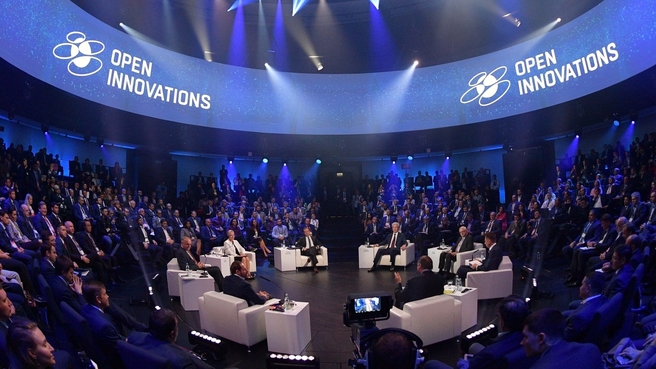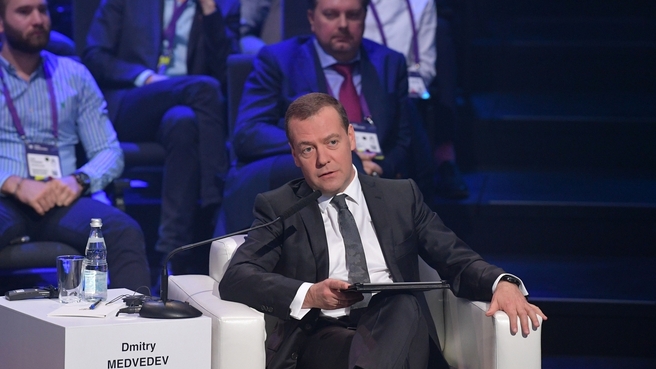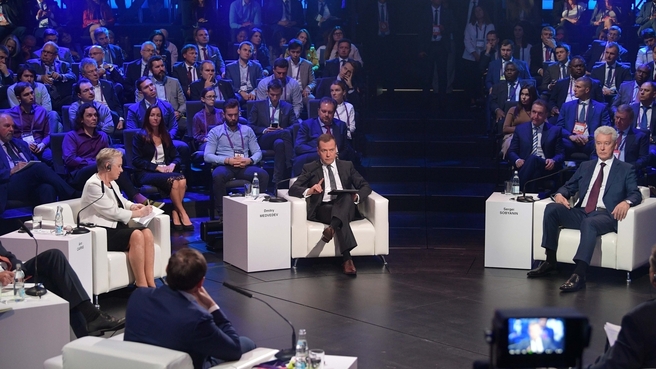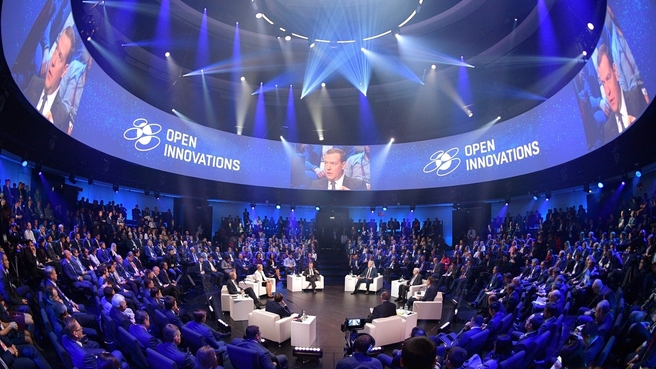The plenary session’s theme is Smart Country: National Strategy.
The international innovation-driven development forum, Open Innovations, has been held in Moscow since 2012 and is co-hosted by the Ministry of Economic Development, the Moscow Government, the Rusnano Fund for Infrastructure and Educational Programmes, the Russian Venture Company, the Foundation for Promoting Innovation, the Skolkovo Foundation and Vnesheconombank.
In 2018, the Open Innovations forum is taking place between October 15-17 as a three-day themed discussion at the Skolkovo Technology Park with the participation of the Foreign Investment Advisory Council. The theme of this year’s forum is Sources of Digital Breakthrough.
The first day of the forum was dedicated to the digitalisation and modernisation of education. The agenda of the second day includes digital transformation of the business environment and development of the innovation-driven ecosystem. On the third day, the forum participants will focus on science and technology.
Dmitry Medvedev’s remarks at the plenary session:
Plenary session of the 7th Open Innovations Moscow International Forum
Good afternoon, colleagues, ladies and gentlemen,
Once again, welcome to our Open Innovations forum. This is the 7th such forum, and the topic of today's discussions is Smart Country. Everyone, I’m sure, already knows what a smart home is. Now we need to make a smart home out of our country.
In the digital age, the speed and magnitude of change is growing steadily. To take advantage of the benefits offered by progress, it is imperative to create an environment that is capable of being constantly upgraded. The main components include modern technological infrastructure and readiness of the people to develop and use these innovative technologies. Only in this case is it possible to proceed with digitalisation, which will bring the economy, the social sphere, and state management to a new level of efficiency, to a level that corresponds to the Smart Country concept.
These are the goals Russia is pursuing today. As you may be aware, we have adopted the Digital Economy programme, and it works. Currently it is being reformatted into a national project, which shows the importance we attach to the digital economy. It includes six federal projects on key areas of digitalisation. The cost of the programme is 1 trillion roubles. In all, we will allocate a total of 2 trillion roubles in public investment to developing the digital economy. We clearly understand that the task is complex and there is a lot of work to do. So, I will focus on key areas that should turn Russia into such a smart country.
The first and probably the most important thing is people themselves – for smart people make a Smart Country. On the one hand, we are talking about the leaders of change; on the other hand, what matters is the ability to translate changes into scientific projects, innovative products, various services, and management decisions. I am confident that there are a lot of such people in Russia.
I will give one example, very eloquent in itself: for eight years now, no one has been able to beat our country, our young people at the ACM ICPC International Collegiate Programming Contest. This year, Moscow State University students won the contest, and before them, the ITMO University team held the first place for seven years in a row. No one has ever done that. This is an example proving that we have a really large number of people capable of transforming Russia into a modern Smart Country.
We intend to dramatically increase the number of specialists in the digital economy trained at Russian universities, from 48,000 to 120,000 people per year (by 2024). We will definitely support young mathematicians and computer programmers. This is one of the parts of the Digital Economy programme; funds have been allocated for it.
On the other hand, a Smart Country is hardly possible without the activity of ordinary users. As research shows, people in Russia are much more willing to adopt technological innovations than even the Europeans.
Last year, our country for the first time ranked with the top ten digital economy leaders in the Digital Society Index ranking – due to the high involvement of people. Digital services such as calling a taxi, car sharing, bicycle rental, buying food and other goods online have become an everyday thing for many Russians. In the very least these services have one advantage: they eliminate the middlemen, and therefore make the service less expensive. For a country as large as Russia, this innovation also reaches out to remote areas, qualitatively changing the lives of people there.
E-commerce grew by more than a quarter, by 26 percent last year, and continues to grow. We plan on helping people master new technologies through public educational programmes.
The second point we plan to focus on is infrastructure development. Access to knowledge and competencies must be supported by access to the technology proper. We also have some achievements when it comes to this. Russia ranks first in Europe and sixth in the world by the number of internet users – largely due to the fact that it is less costly than in many developed countries. We simply must keep up this competitive advantage.
However, it must be admitted that digitalisation has mostly covered big cities so far. While Moscow and St Petersburg can be compared with most global leaders, other Russian regions are still lagging behind. We intend to eliminate this digital inequality, especially to be able to expand the potential of medicine, online learning and the provision of public services. This will naturally require the development of data storage and processing infrastructure and network deployment for what is known as the Internet of Things. The Digital Economy programme also stipulates work in these spheres.
One of them is the development of next-generation cellular networks. Russian operators are already testing 5G equipment; the project is costly and requires to be thought out properly. We have to build an infrastructure for new services with increased requirements for data transfer speed and response time. This is probably especially important in the context of the problem the world is now considering – creating artificial intelligence.
Smart Country requires national technological leaders. Digitalisation is a powerful incentive for innovation. Therefore, the third target of our work is cooperation with the most successful high-tech companies and creating incentives for more high-tech companies to grow.
I will cite some examples. The National Champions project with about 100 participating companies is led by the Ministry of Economic Development and is dedicated to locating and supporting companies that successfully compete with foreign manufacturers both domestically and internationally.
Promising start-up businesses in the sphere of the Internet of Things and artificial intelligence are supported by the Internet Initiatives Development Fund and Rusnano. Sberbank is also making major research efforts in the area of artificial intelligence.
The fourth task is to create up to date legal regulation. I have repeatedly addressed this subject. This is not an easy task. However, technological advances depend on the level of comfort provided by legislation, or these technologies will go to another jurisdiction. Here, I believe, legislation should at least not block development. This comfort means the absence of excessive legal regulation, and it is necessary precisely because modern digital economy and the digital world are developing very rapidly. Our attempts to squeeze all kinds of terms and definitions from digital economy and online technology into the Procrustean bed of law are often doomed to failure, simply because every six months everything changes and we have to come up with something new. So, these regulations should be of a fairly general nature.
Such work is being carried out as part of the Digital Environment Regulation project. Moreover, we need to eliminate limitations that have been associated with the development of paperwork and the usual eye-to-eye forms of communication.
A federal law has been passed thanks to which information systems, databases and websites can be objects of concession contracts (which is not bad in itself, because this is about commercialisation) or public-private partnership agreements.
Everything that we are doing will be twisted and corrupted unless we make cyberspace secure. This is the fifth area of focus, which is a priority for all states. Russia is no exception. The gamut of virtual scams is becoming more complex as technology develops. According to experts, in 2017 alone, cyber attacks led to losses in the amount of nearly $1 trillion. Just think of this figure. It defies imagination. In Russia, this figure stands at about 600 billion roubles, which is also a substantial amount of money for our economy.
Cybersecurity issues are tackled mostly by businesses. However, clearly, cooperation is needed both at the national and, most importantly, global level. This is a complex and important task. It is much easier to criticise each other, keep saying that certain problems exist, or blame each other for certain things. Reaching a global agreement is a much more complex and important task. Only in this case will companies be able to trust each other, and people will be able to trust services and freely invest in various projects.
Our goal is to create a solid security system for transferring, processing and storing data that will guarantee the protection of the interests of individuals, businesses and the state. The Digital Economy programme addresses this subject as well.
The digitalisation of public administration is another important topic. This is the sixth area of focus in which we engage. This work is already paying back. These figures have already been mentioned here today: in 2018, Russia, for the first time, found itself among the countries with very high, according to the UN, levels of e-government. Our country ranked 32nd among 193 countries on the e-government index, next to Israel and Belgium.
Progress in the provision of government services is particularly tangible. As of early 2018, the number of registered users of the State Services website stood at 65 million people (this is actually a huge number for our country), having increased by 25 million people in a matter of one year. What does this mean? This means that a great number of people trust this service and find it convenient as opposed to a few years back when it appeared rather exotic.
In fact, we have clear leaders here. According to McKinsey consulting firm, Moscow ranks second after London in terms of the implementation of smart solutions. According to the UN, which we trust more, we rank first globally. Moscow is unmatched in Europe by the number of residents who are aware of and use innovative solutions. This is a tremendous success.
However, it is important that other regions too become part of the accelerated innovation-based development. For us, perhaps, this is the most difficult job. This is the same old digital divide problem. The digital transformation programmes in our regions are being developed only now. Some of them have already become successful in housing and utilities services, e-government, and creating an innovative structure for start-up businesses. We will continue to replicate such practices at the federal level.
The next-level goal in the sphere of public administration is to move away from automated paperwork processes towards innovative forms of providing public services. The state should perform its functions on the basis of data management, and the colossal amounts of information that are collected in state information systems create unique opportunities for doing this. This includes the introduction of machine learning technology and artificial intelligence.
Colleagues, what I mentioned indicates our progress and, I’m sure, this will speed up Russia’s technological development. Here, one of our national goals, or the seventh area of our work, in fact, goes beyond the Digital Economy programme. We need to link all 10 national projects that we currently engage in with achieving this goal and encourage their participants to introduce innovative technologies. To do this, many sectors of the economy and the social sphere need to be digitised. We need to maximise the number of companies that implement innovations.
We managed to create large digital companies in our country virtually from the ground up. Some of them have received international recognition and can share impressive success stories, such as Yandex, which competes with Google on the domestic and a number of foreign markets. Social networks, such as VKontakte and Odnoklassniki are not only leaders in terms of the size of the audience in the post-Soviet space, but also large-scale digital platforms for electronic payments, games and retail business. We also have major players when it comes to online banking. I'm not even mentioning various software products that are used throughout the world.
So, we have no doubt that technological cooperation between Russia and other countries remains a two-way road. Russia is interacting in this field with its partners from the Eurasian Economic Union. A common digital agenda has been outlined for years to come. We plan to actively work across all key areas of digital transformation from regulation to specific industry projects. Of course, we must be willing to learn, share experiences as well as to contribute to the global development of technology.
















